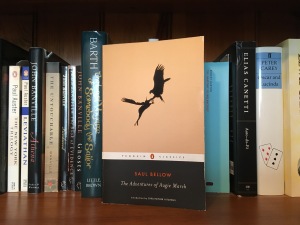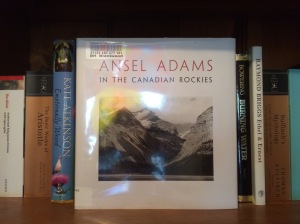A Tremendous Canada of Light
Saul Bellow, The Adventures of Augie March (1953)
Though he was born in Lachine, Quebec, Bellow moved to the U.S. at the age of nine and I think, for the purposes of this website, he can be considered an American author. The Adventures of Augie March, however, does contain quite a number of references to Canada — enough that one might almost wonder whether, at some subconscious level, Bellow is trying to work out some issue(s) related to the country of his birth.
In any case, we’ll take a look at them.
Smuggling Immigrants Out of Canada
This idea comes up several times in the novel, and while I assume that Bellow’s family entered the United States legally, there is nevertheless an echo of his own history in this portrayal of immigration. The first reference occurs when Five Properties consults with Grandma Lausch about getting married:
Five Properties was keen on getting married. He took the question up with everybody and naturally had been to see Grandma Lausch about it, and she masked herself up as usual and looked considerate and polite while in secret she checked off and collected what she wanted for her file. But also she saw a piece of change in it for her, a matchmaker’s fee. She watched for business opportunities. Once she had masterminded the smuggling of some immigrants from Canada. (25)
It recurs when Augie meets Joe Gorman, a character he was previously involved with in an aborted robbery attempt. This time Gorman has a new scheme:
“What’s up with you?” I said, for I didn’t want to ask explicitly; it was bad manners. “Do you ever see Sailor Bulba?”
“Not that dumbhead, he’s no good to me. He’s in an organization now, slugger for a union, and it’s all he’s good for. Besides, what I’m in now, I have no use for anybody like that. But I could do something for you if you wanted to earn a fast buck.”
“Is it risky?”
“Nothing like what worried you last time. I don’t go in for that any more myself. It’s not legitimate, what I’m doing, but it’s a lot easier and safer. And what do you think makes the buck so fast?”
“Well, what is it?”
“Running immigrants over the border from Canada, from around Rouse’s Point over to Massena Springs, New York.”
“No,” I said, not having forgotten my conversation with Einhorn. “I can’t do that.” (174)
In the end, however, Augie does get involved, agreeing to help Gorman with the driving but not the actual immigrant-smuggling:
All this was how I decided, in my outer mind, to go; with the other, the inner, I wanted a change of pressure, and to get out of the city. As for the immigrants, my thought about them was, Hell, why shouldn’t they be here with the rest of us if they want to be? There’s enough to go around of everything including hard luck. (174-75)
The subject appears one more time, briefly, in a conversation between Augie and his wife Stella:
“Oh, Augie! Please, honey, remember that you made mistakes too. You went to smuggle immigrants from Canada. You stole. A lot of people led you astray also.” (574)
What’s interesting about this particular thread of the novel is that we have often seen Canada portrayed as a place that people want to escape to: a fresh start in Dickens and Basil Bunting, draft dodgers in Lorrie Moore, the Underground Railroad in Chris Kraus, an escape from an American fascist regime in both the Philips, Roth and K. Dick; but it is much more unusual to see Canada portrayed as a place people want to escape from. Here, however, at least according to what Augie says, these immigrants want to get out of Canada and into the U.S., apparently in search of better opportunities that Canada can’t offer them. So this represents an interesting reversal of a common theme.
Canadian Hunting Trips
I don’t want to regurgitate the plot of this novel, which is long and complicated, but just so that the following quotes make sense, I’ll note that the long central section involves Augie and a woman named Thea going to Mexico with an eagle named Caligula, which they are trying to train to catch iguanas (or some other lizard) for some purpose that, to be honest, I no longer recall. This passage is part of the explanation of how Thea and Augie end up together:
Now, when I had called in from South Chicago, Thea had told me she didn’t have much time, she would have to leave soon. And the first few days, as I’ve said, she didn’t speak of it, but eventually the open suitcases brought up the subject and she told me that she had been, and legally still was, married, and she was on her way from Long Island to Mexico to get a divorce. Afraid to hurt my feelings, all she’d say at the outset was that her husband was considerably older than either of us and was very rich. But gradually more came out. He flew a Stinson plane, he had tons of ice dumped in his private lake when it became lukewarm in July, he went on Canadian hunting trips, he wore cufflinks worth fifteen hundred dollars, he sent to Oregon for apples and they cost him forty cents apiece, he cried because he was growing bald so quickly, etcetera. (340-41)
Here the Canadian hunting trips are clearly meant to be seen as one more element in the life of the leisured rich; beneath that, they carry the suggestion that Canada is a less civilized nation, more of an unspoiled wilderness where rich Americans can go to hunt. This, of course, connects naturally with the idea of the Canadian cottage in Chimamanda Ngozi Adichie’s “That Thing Around Your Neck,” and also with the idea of fishing in Canada that has come up in the work of several of Bellow’s rough contemporaries, such as John Cheever and Frederick Exley.
Canada As Metaphor
Canada also appears several times in the book in what I think of as a metaphorical sense; that is to say, the reference isn’t really about Canada, but rather uses Canada to stand in for some other idea.
For example, when Caligula, the eagle they are trying to train, escapes from Thea and Augie, it is described this way:
Thea shrieked at him, “You stinking coward! You crow!” She picked up a stone and flung it at him. Her aim was wide; Caligula only raised his head when it struck above him.
“Stop that, Thea! For the love of God, stop! He’ll tear out your eyes!”
“Let him try to come at me, I’ll kill him with my hands. Let him just come near!” She left her mind with fury, and there was no sense in her eyes. I felt my arms weak, seeing her like this. I tried to keep her from throwing another stone, and when I couldn’t I ran to unstrap the shotgun for use, and also to keep it from her. Again she missed, but this time came close, and Caligula took off. As he rose I thought, Good-by bird! There he goes to Canada or Brazil. (386)
Here Canada is paired with Brazil, representing the farthest northern point Augie imagines the eagle might fly to, while Brazil represents the southern end of his imagined flight. There is no real idea of Canada here, though, beyond the fact that it is a place far to the north of Mexico.
There are several similar uses of Canada (or places in Canada) to convey other points. This one is part of a description of the typical conversation between Einhorn and his cronies:
Be this as it might, the topic inside the railed space of benches or at the pinochle game in the side-office annex was mostly business — receiverships, amortizations, wills, and practically nothing else. As rigor is the theme of Labrador, breathing of the summits of the Andes, space to the Cornish miner who lies in a seam under the sea. (77)
The idea here seems to be that certain topics are inevitably associated with certain places. The fact that “rigor is the theme of Labrador” ties into larger ideas about Canada, and Labrador in particular, being a place with a harsh climate, where survival is difficult.
A similar idea comes up in this passage about Augie’s brother Simon:
Such a consideration would never trouble Simon. Whatever the place was, he would make it pay off, the only relation with it that concerned him; it had dollars, as the rock water, as the waste-looking mountain is made to spit its oil or iron, where otherwise human beings would have no wish to go, the barrens, the Newfoundlands, the scaly earths and the Antarctic snow blackened with the smoke of fuel tapped in Texas or Persia. (248)
Here again, Canada — this time Newfoundland — is portrayed as a harsh place that no one would want to live, except for the fact that it contains natural resources that, through hard work and industry, can be turned into profit for those with the nerve to extract them.
And finally, after Augie’s attempt to help Gorman with the immigrant-smuggling falls apart, Augie hops freight trains to try to make his way back to Chicago:
As the sun went south it was back of us and not on the left hand; we were going north. There was no getting off either. I sat down, legs hanging at the open door, back-broken and dry, hungry furthermore, and my eyes followed the spin of the fields newly laid out for sowing, the oak woods with hard bronze survivor leaves, and a world of great size beyond, of fair clouds and then of abstraction, a tremendous Canada of light. (183)
The movement at the end of that sentence, from cloud formations to abstraction to light — it could almost be a description of a Turner painting — gives the feeling of Augie watching a vast, shining land of possibility recede out of reach, and seems to give the lie to the aspirations of the immigrants who want to be smuggled out of that world and into the U.S. Is Bellow, whose own family made the journey from Canada to the U.S. when he was a child, looking back, through the eyes of his character, at Canada with regret and seeing in it a brilliant world of unlimited potential? It seems unlikely, given the ostentatious, almost aggressive American-ness of the novel’s famous opening paragraph. But perhaps that is overcompensation, and perhaps here, in this quietly reflective moment, we see his true vision of our country, a vision of opportunities forever closed off and lost.
Surely, along with Paul Muldoon’s “gateless gates of Canada,” one of the more beautiful images of our country that we have come across, if a slightly melancholy one.






